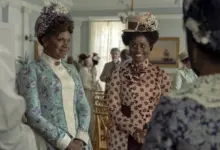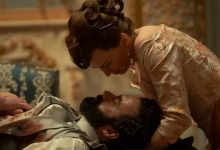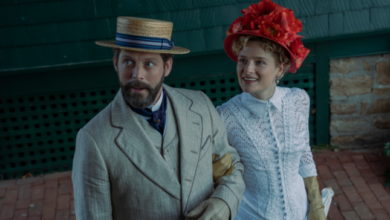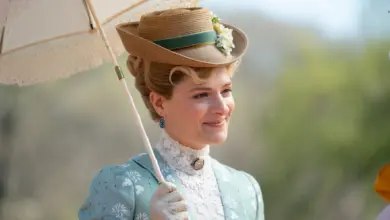‘The Gilded Age’ is the least dramatic drama on TV — and that’s why fans love it
“The Gilded Age” is, according to those who watch and discuss it, “the best show on television,” “high camp,” “the most experimental show on TV” or “objectively not good.”
No matter where they fall on the spectrum of appreciation, though, many a “Gilded Age” viewer wouldn’t dare miss an episode. (“The Gilded Age” airs on HBO, which shares parent company Warner Bros. Discovery with CNN.)
When “The Gilded Age” premiered, critics and viewers didn’t quite know what to make of it. It shared critical DNA with “Downton Abbey,” namely the involvement of series creator Julian Fellowes, but, some reviews noted, lacked the previous show’s dramatic heft and reliable writing.
Though it starred prestige drama veterans Carrie Coon and Christine Baranski and Broadway stars like Audra McDonald, Donna Murphy and Kelli O’Hara, many critics agreed that the series felt far less substantial than its predecessor: The New York Times called its first season a “dime-store ‘Downton.’”
But in its second, and, as CNN critic Brian Lowry noted, possibly final season, many viewers have tuned into its very specific, soapy wavelength where even the highest stakes don’t feel that serious. The eloquent insults Baranski’s Agnes van Rhijn hurls at everyone in her orbit, the show’s flimsy commitment to historical accuracy, the delightful mundanity of its drama — all are charming to those who have accepted that “Downton,” this is not.
There’s the season-premiere reveal that the niece of old-money matriarch Agnes is teaching watercolor painting to children, a ghastly profession that would shame their family should it become public. There’s the sudden wedding between Cynthia Nixon’s spinster-no-more and a priest, during which her widowed sister makes a late, show-stopping entrance. And there’s the reappearance of a conniving lady’s maid — who last season attempted to seduce nouveau riche tycoon George Russell — now married to an old millionaire and conspiring to spoil a soup.
It’s seemingly inconsequential stuff that wouldn’t even crack the B-story of another drama in its time slot. But that’s how its fans like it.
“You don’t need a fungi that makes people zombies or an army of undead approaching middle age kingdoms to make a show compelling, and this show proves that,” said Nirupam Dhakal, a writer and filmmaker and prolific TikTok chronicler of “Gilded Age” goings-on. “Sometimes all you need is Christine Baranski crossing the street furiously to keep us on the edge of our seats.”
Though it took some time, it seems “The Gilded Age” has finally found its ideal audience — those who find comfort and pleasure in its snowglobe of a series, where soup and street-crossings can be as consequential as an ill-fated automobile ride.
Why ‘The Gilded Age’ works

Many “Gilded Age” viewers tuned in because they were fans of Fellowes’ “Downton Abbey,” a respected PBS hit depicting the upstairs-downstairs affairs in the massive home of a British aristocratic family. But many of those fans quickly realized that this show wasn’t straining to resemble “Downton Abbey” in anything other than genre.
“It’s a little preposterous, but that’s what it’s supposed to be,” said Robert Khederian, a New York City real estate agent and Gilded Age architecture enthusiast who initially didn’t enjoy the show. “I can’t really describe it any other way than compulsively watchable and total frivolity.”
Khederian has, on TikTok, poked gentle fun at the show for its various historical inaccuracies that initially distracted and irritated him and fellow history buffs. But once he leaned into its preoccupation with the seemingly unimportant squabbles between New York’s wealthiest families, it quickly became his most-anticipated series of the week.
“Now we’re very aware of how, in so many words, silly the show is,” Khederian told CNN. “You have to sign onto the fact that it’s not going to be this kind of cultural or intellectual juggernaut. It’s the TV version of a beach read.”
Khederian, a fan of both series, noted that both “Downton” and “The Gilded Age” feature storylines revolving around ruining a soup. But where one of “Downton’s” soup story felt genuinely suspenseful — a chauffeur plans to douse a military official at dinner with a “soup” containing cow dung — “Gilded Age’s” soup snafu is neatly averted, he said.
Turner, the former lady’s maid and new member of the wealthy elite, conspires with her former coworkers to ruin the soup at a dinner her former employer Bertha Russell is hosting for a British duke. Before it makes its way anywhere near its intended target, kitchen staff realize the soup has been spoiled and fire those responsible. (Fellowes clearly has an affinity for his characters using soup as a weapon of sorts.)
But “The Gilded Age’s” propensity for introducing an issue and quickly solving it is part of the delight of watching it, noted Rachel Shukert, showrunner of Netflix’s “The Babysitter’s Club” adaptation and a producer on “Glow” and “The Handmaid’s Tale.” She wrote in November that the HBO series “takes everything we have been told constitutes “good storytelling” and gleefully does the exact opposite.
“Watching it feels like freedom,” she wrote on X, the platform formerly known as Twitter. “Like how kids play with dolls.”
Fans dissect its frothy fun every Sunday

Fan participation started to pick up with the premiere of “The Gilded Age’s” second season. TikTok critics like Dhakal started encouraging their many followers to watch the show and dissect the sisterly relationship between Agnes and Ada or join the fan club of Aurora Fane, whom Dhakal called the “Lady Gaga of ‘The Gilded Age’” for her proximity to gay stars of the period, like Oscar Wilde, who makes a delightful surprise appearance on the second season.
For the show’s often-light touch, the performances are uniformly committed, Dhakal told CNN. They praised an emotional scene between Denée Benton and Audra McDonald, who play mother and daughter, after Benton’s Peggy, a Black writer from an affluent family, decided to take on a journalism project in the South. (Peggy is often saddled with the series’ most weighty storylines.)
Even if most of the series’ plots or lack thereof can feel thin, Fellowes knows how to build a lived-in world, said Dave Winchell, who co-hosts the podcast “Lords of Grantham” about “The Gilded Age,” “The Crown” and other historical dramas. Take Nathan Lane’s Ward McAllister, a Southern gentleman and social kingmaker who attempts to avoid detection while crossing the horse feces-laden street between mansions.
“A hammy Southern gentleman airdropped into New York society might feel absolutely absurd in another show, but Julian has great control over how his characters interact with robber barons and socialites and opera singers to the point where you forget that McAllister sounds the way he sounds,” Winchell told CNN.
There are plenty of “misfit toys” like McAllister on “The Gilded Age,” Winchell noted, each with their own curious story that don’t appear to figure into the wider world of the show (like house staffer Jack Trotter, consistently tinkering with an alarm clock in the background). Their disparate stories are minor compared to the “opera war” between Bertha Russell and the New York old guard, but there are few dramas of its stature that would devote significant screen time to a man building a clock.
Khederian can hardly tell anymore whether he loves to hate “The Gilded Age” or has fallen head-over-heels for its “silliness.” He’d be “devastated” if it’s canceled after this season, he said, but he believes it would find a new, devoted audience long after it’s off the air.
“It’s just so much fun,” he said. “I think it’s what people really want right now — a low-stakes good time where they can just turn their brain off and watch Donna Murphy seethe quietly in an opera box.”





